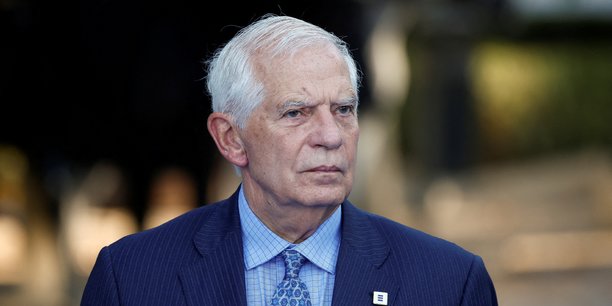When Josep Borell, head of European diplomacy, arrived in China on Thursday October 13, it was with the firm intention of defending the European strategy of “risk reduction” in the face of its main trading partner and of laying the foundations for a bilateral summit this year.
This is evidenced by his remarks this Friday during a speech at the prestigious Peking University, Tsinghua. “Trust is at the heart of every human relationship and mutual trust has been undermined,” he lamented, assuring that “we must strive to restore this trust. She won’t come back by miracle.” In front of students at Peking University, he declared on Friday that the trade imbalance between the EU and China is not only quantitative, but also qualitative. “In my opinion, in our opinion, the cause is the result of the persistent difficulties encountered by European companies when they want to access the Chinese market,” he said.
While visiting China on September 25, the Vice-President of the European Commission Valdis Dombrovskis had already denounced the “discrimination” to which European companies would be subject in China.
“This has resulted in less transparency, unequal access to public markets, discrimination in security standards and requirements, as well as requirements in terms of localization and data transfer,” he said.
And added: “The new foreign relations law and the new version of the anti-espionage law greatly worry our business community” because “their ambiguity leaves too much room for interpretation.” Before concluding that this “more politicized commercial environment” worries European companies.
“Neither we nor China can ignore each other’s market”
Josep Borrell’s visit, postponed twice this year, is due to last until Saturday and will address themes such as bilateral relations, international issues and trade. It began Thursday with an “exciting exchange” in Shanghai with European companies “on economic and commercial challenges,” the head of European diplomacy said on the social network X (formerly Twitter). “We must address these challenges, because neither we nor China can ignore the other’s market,” he stressed.
“China welcomes the visit of High Representative Borrell” which “will give new impetus to the joint efforts of the two sides to address global challenges and maintain peace and stability in the world,” welcomed Wang Wenbin, a foreign minister, on Wednesday. – spokesperson for the Chinese Ministry of Foreign Affairs.
“While the international situation is unstable and global challenges are multiplying, only solidarity and cooperation will enable the international community to better meet them,” he stressed during a regular press briefing. “As two major global forces, two major markets and two major civilizations, China and Europe have broad common interests.”
A dispute surrounding subsidies from Chinese authorities to national manufacturers of electric automobiles
Sino-European relations have been strained since Russia’s invasion of Ukraine in February 2022 because Beijing, which calls for respect for the territorial integrity of all states, has not condemned Moscow. Brussels is trying to reconcile its desire to be less dependent on the Asian giant, particularly economically, while maintaining strong ties with the world’s second largest economy on trade, the climate and even human rights.
Coming to China on an official visit in April, Ursula von der Leyen announced last month the opening of an EU investigation into the support and subsidies of the Chinese authorities to national manufacturers of electric automobiles. A measure justified by the desire to defend European industry against vehicles sold according to it at “artificially low prices” on world markets. China denounced the investigation, stressing that it would damage its trade relations with the EU. “This is nothing other than pure protectionism,” judges Beijing. At the beginning of October, the EU also unveiled a list of strategic areas which must be better defended against states considered rivals such as China – in particular artificial intelligence.
This article is originally published on .latribune.fr









